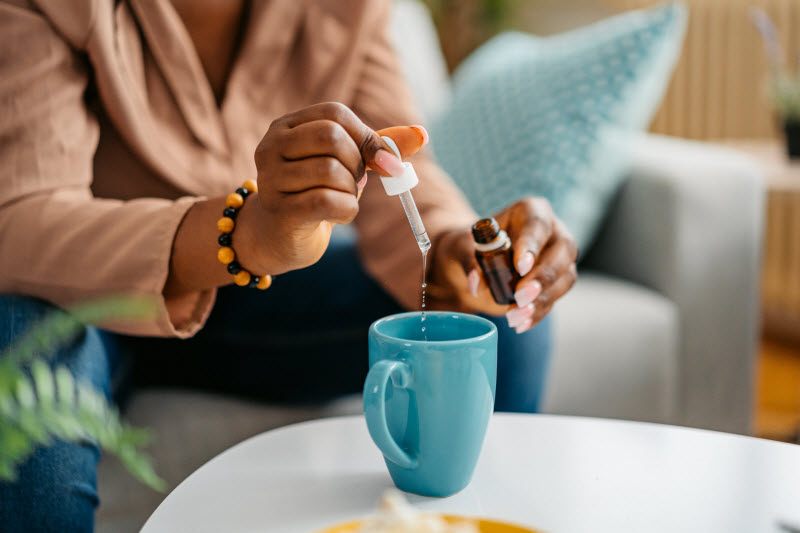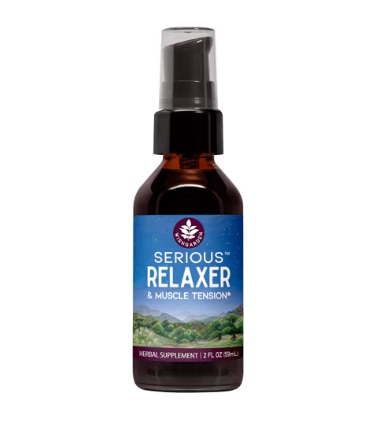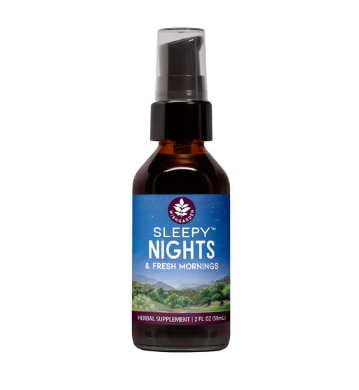Tired of tossing and turning? You’re not alone. According to the Johns Hopkins Center for Sleep, more than 60 million Americans experience poor sleep quality, including common sleep disorders. Adults aged 18 to 60 need at least seven hours of sleep per night to support overall well-being. Getting less than that not only leaves you feeling groggy, it can impact your emotional and physical health. Sleep deprivation can affect your memory, concentration and mood while also increasing risk for other serious health issues.
Stress, racing thoughts and overworked adrenals can make it tough to fall or stay asleep, resulting in fatigue, mood imbalances and diminished daily performance. While prescription sleep aids are an option, many prefer a more natural approach to avoid grogginess or dependency. Herbal remedies have been used for centuries to promote restful sleep, and modern research is catching up to validate their benefits.
Morning calm for nighttime peace
Believe it or not, setting yourself up for restful sleep starts the moment you wake up. Many of us unknowingly stress our nervous systems first thing in the morning. Do you reach for your phone before even stepping out of bed? Many of us do. Consider swapping that habit for a more mindful wake-up routine. When your alarm goes off, resist the urge to open emails or start browsing Instagram. Instead:
- Stretch gently for 2-3 minutes
- Take several deep breaths
- Sip a glass of water
- Set an intention for the day
Just a few moments of morning stillness can work wonders for your nervous system, as well as the quality of your sleep later on.
Midday mindfulness to relieve stress
One of the keys to better sleep is to keep stress in check throughout the day. Mindfulness practices and herbs that support healthy adrenal glands can help calm the nervous system, making it easier to transition into sleep at night.
Try this simple trick: whenever stress creeps in, remind yourself to drop your shoulders, relax your jaw and take a deep breath. The more we tune into these subtle tension signals, the more control we gain over our stress response. Exercise is also a great way to shake off built-up tension and clear the mind.
Practicing mindfulness throughout the day takes effort, but your actions will lead to refreshing sleep, and your future well-rested self will thank you.
Vitamins and nutrients for restful sleep
A well-rounded diet is important for overall health. It matters for healthy sleep, too. Three nutrients in particular support better rest by promoting relaxation and by helping to balance sleep-related hormones. Be sure to load up on foods rich in:
Magnesium: This essential mineral plays a crucial role in regulating neurotransmitters, supporting healthy melatonin production, calming the nervous system, relaxing muscles and promoting a steady heart rhythm[3]. Consider magnesium supplements that are gentle on the digestive system.
Vitamin D: Every cell in your body has a receptor for vitamin D, making it essential for nearly every system and bodily function, including sleep regulation. Vitamin D helps support serotonin and melatonin production and plays a role in immune and nervous system function. Exposure to sunlight helps our bodies to make vitamin D. You can also obtain it by eating foods such as fortified milks and cereals or taking a supplement.
Essential fatty acids: Omega-3 essential fatty acids (EPA and DHA) are necessary for brain health and melatonin production. These healthy fats also nourish the nervous system and support cardiovascular wellness. Dietary sources include fish, nuts, seeds, avocados and various plant or fish oils.
Herbs that help with sleep
Several herbs have been used traditionally to support healthy sleep. While research continues to explore their mechanisms, these botanical allies offer natural ways to unwind and drift off peacefully. †
Valerian root: The ancient sleep supporter†
Valerian (Valeriana officinalis) has been a go-to for sleep support since the 18th century. This earthy, slightly funky-smelling root supports healthy GABA levels and soothes muscle tension. †
A 2020 review and meta-analysis backed up what herbalists have known for centuries—valerian can effectively support sleep quality, though a few people might notice mild digestive discomfort. It works particularly well when you need help both falling and staying asleep throughout the night. †
Pro tip: For best results, take valerian about 30-60 minutes before bedtime, as it works gradually rather than producing an immediate sedative effect. Many people find it pairs beautifully with other sleep herbs like hops.
Passionflower: The overthinker’s best friend
If your brain regularly replays awkward moments from middle school at 2 a.m., passionflower (Passiflora incarnata) is here to help. Traditionally used by Native Americans, this stunning vine supports relaxation and may help quiet the mental chatter that keeps you up at night.†
Science agrees passionflower promotes calmness without knocking you out cold. When combined with other sleep-supporting herbs, it can help improve overall sleep quality. It’s also a great herbal ally for daytime stress support. †
Scullcap: The tension tamer†
Scullcap (Scutellaria lateriflora) is like a deep exhale for your nervous system. If a tight, restless body is keeping you up, this herb helps ease muscle tension so you can fully relax. †
Research suggests that scullcap not only supports relaxation but may also help you fall asleep faster. † Think of it as a gentle “off” switch for physical stress.
Lemon balm: The gentle sleep whisperer†
Lemon balm (Melissa officinalis) is the herb equivalent of a warm cup of soothing tea or the feeling of a weighted blanket—comforting, gentle and perfect for winding down. With its bright, citrusy aroma, this botanical has been used traditionally to calm both mind and body. It’s also been said to ease “crankiness” in children. †
Lemon balm supports healthy GABA metabolism, making it a natural ally for relaxation. † Plus, it’s mild and well-tolerated by most people.
Hops: Not just for happy hour
Yep, the same hops (Humulus lupulus) that make your favorite craft beer may also help you sleep like a baby. This herb is believed to be helpful for stress-related sleep disturbances or hormone-related restlessness. †
When paired with valerian, hops promote deep, restorative sleep.† So if your sleep struggles come from stress, shifting hormones or just general overactivity, this botanical duo might be the natural support you need. †
Combine herbs with sleep hygiene best practices
Herbs work best when paired with a consistent sleep schedule, regular physical exercise and good sleep habits. Optimize your rest with these simple strategies:
- Stick to a schedule: Keep a consistent bedtime and wake-up time, even on weekends.
- Create a sleep sanctuary: Keep your bedroom cool (65-68°F), dark and quiet.
- Limit blue light exposure: Reduce screen time before bed to avoid disrupting melatonin production.
- Watch your intake: Avoid caffeine in the afternoon and alcohol before bed.
- Move your body: Regular exercise can improve sleep quality but aim to finish workouts at least two hours before bedtime.
- Manage stress: Utilize relaxation techniques like deep breathing or meditation throughout the day.
Create a bedtime ritual for quality sleep
A consistent sleep routine signals your body that it’s time to unwind. For better sleep, enact the following steps (and consider limiting daytime naps):
- Enjoy a cup of sleep-supporting herbal tea or take your preferred herbal formula.
- Dim the lights an hour before bed.
- Take a warm bath with Epsom salts.
- Do gentle stretching or restorative yoga.
- Read a physical book or journal.
- Use essential oils like lavender.
- Listen to calming music or guided meditation.
For ongoing sleep struggles, consider consulting a healthcare provider. Prioritizing quality sleep is one of the best things you can do for your overall well-being!
†These statements have not been approved by the Food and Drug Administration. These products are not intended to diagnose, treat, cure or prevent disease.




